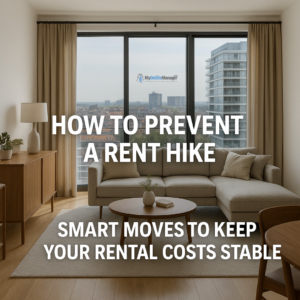For millions of renters across the U.S., one of the biggest fears is receiving that dreaded notice: your rent is going up. With housing costs continuing to outpace wages in many cities, even a modest increase can stretch a tenant’s budget to the limit.
The good news? Rent hikes are not always set in stone. By knowing your rights, preparing early, and using the right strategies, you can often prevent or at least soften the impact of rising rent. Here are smart, actionable steps every renter should consider before signing their next lease renewal.
1. Know Your Lease Inside-Out
Your lease is the first line of defense against unwanted surprises. It spells out when and how your landlord can raise rent, as well as how much notice they’re legally required to give. For example, in many states, landlords must provide at least 30 to 60 days’ notice before a rent increase, and in some rent-controlled cities, limits are placed on how high that increase can be.
Take time to review your lease before renewal season. Look for details like:
-
Notice periods for rent increases.
-
Caps or limits tied to local laws.
-
Automatic renewal clauses that could lock you into higher rent without negotiation.
Knowing these terms empowers you to spot when an increase isn’t legal or when you still have room to push back.
2. Negotiate Before the Increase Hits
Landlords often prefer stability. A reliable tenant who pays on time and takes care of the property is worth more than risking vacancy or dealing with new renters. That gives you bargaining power.
Don’t wait until after you receive an increase notice. Reach out one to two months before your lease ends. Express your interest in staying and ask whether the landlord is open to renewing at the current rate or at least a more manageable one.
When negotiating, highlight:
-
Your record of on-time payments.
-
The fact that you’re a low-maintenance tenant.
-
Your willingness to sign a longer lease for stability.
Many landlords would rather accept a smaller increase than risk losing a good tenant.
3. Offer Something in Return
Negotiation is a two-way street. If you want your landlord to bend, offer them something of value in return. This could include:
-
Signing a longer lease (12–24 months instead of 6).
-
Taking on small maintenance tasks to save them time and money.
-
Prepaying rent for a month or two if your finances allow.
Each of these signals lower risk and higher stability for your landlord two things they value highly.
4. Stay Informed About Market Rates
Knowledge is power. Before sitting down to negotiate, research rental listings in your neighborhood. If you find that your landlord’s proposed increase would push your unit well above market average, you’ll have solid evidence to argue your case.
Websites like Zillow, Rent.com, and Apartments.com are great starting points. Take screenshots of comparable listings to show your landlord. Even if you can’t avoid an increase, this information could help you reduce the amount.
5. Build a Financial Buffer for Increases
Unfortunately, not all increases are negotiable. In some markets especially high-demand areas like New York, Los Angeles, and Austin landlords know they can fill units quickly at higher prices.
That’s why it’s wise to prepare a rental buffer fund. Setting aside even $50 to $100 a month can help cushion the blow of a hike when it happens. This way, you won’t be forced into scrambling for a new place or taking on debt just to cover rent.
6. Consider Alternatives if the Hike Is Too High
Sometimes, no matter what you do, the numbers won’t add up. In that case, don’t be afraid to explore alternatives:
-
Downsizing to a smaller unit in the same area.
-
Getting a roommate to share costs.
-
Moving to a different neighborhood with better rental rates.
-
Exploring ownership options, if your finances allow, especially in markets where mortgage payments may rival rent.
The key is to be proactive. Start researching alternatives before your lease ends, so you’re not forced into a last-minute decision.
7. Build a Good Relationship With Your Landlord
It may sound simple, but strong tenant-landlord relationships matter. Landlords are far more likely to work with tenants they like and trust. Simple actions like paying rent on time, communicating respectfully, and reporting issues promptly can go a long way toward building goodwill.
That goodwill can often translate into financial leniency when renewal time rolls around.
Final Thoughts
Rent hikes are stressful, but they’re not always inevitable. With careful planning, negotiation skills, and awareness of your local rental market, you can often reduce the amount or at least buy yourself more time at your current rate.
At the end of the day, the best defense is being prepared. Start the conversation early, know your options, and approach your landlord with confidence. The effort you put in now could save you hundreds, even thousands, over the course of your lease.
Source: AOL – Want to Avoid a Rent Hike? Don’t Make These Mistakes

